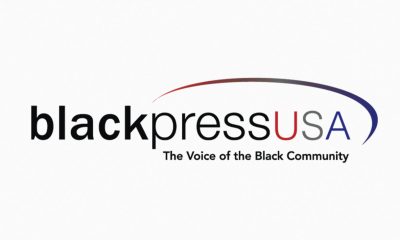#NNPA BlackPress
House Passes Pressley Bill to Reform Broken Credit Reporting System
NNPA NEWSWIRE — Unfortunately, our system of consumer credit reporting is badly broken, and consumers have little recourse. It is typical for credit reports to be filled with unacceptable errors that are difficult for consumers to correct. A Federal Trade Commission (FTC) study found that 1 in 5 consumers have verified errors in their credit reports, and 1 in 20 consumers have errors so serious that they would be denied credit or need to pay more for it. This means about 42 million consumers have errors in their credit reports, and 10 million have errors that can be life altering.
WASHINGTON — The U.S. House of Representatives passed H.R. 3621, the Comprehensive Credit Reporting Enhancement, Disclosure, Innovation, and Transparency Act of 2020 (“Comprehensive CREDIT Act”), legislation sponsored by Rep. Ayanna Pressley (D-MA), by a vote of 221 to 189.
H.R. 3621 would overhaul the credit reporting system by empowering consumers with more control of their data and requiring consumer reporting agencies (CRAs) like Equifax, TransUnion, and Experian, to better ensure that the information on consumer credit reports is accurate and complete.
See below for Chairwoman Waters’ floor statement on the bill.
As Prepared for Delivery
Mr. Chairman, I rise today in strong support of H.R. 3621, the Comprehensive Credit Reporting Enhancement, Disclosure, Innovation, and Transparency Act, legislation sponsored by Representative Ayanna Pressley of Massachusetts. This package of bills builds upon reforms that Members of the Financial Services Committee have been developing for several Congresses.
Mr. Chairman, credit reporting is unlike any other business. Consumers are not customers of credit reporting agencies—they are the product. Credit reporting agencies package up consumers’ data to sell to lenders, employers and other businesses.
Unfortunately, our system of consumer credit reporting is badly broken, and consumers have little recourse. It is typical for credit reports to be filled with unacceptable errors that are difficult for consumers to correct. A Federal Trade Commission (FTC) study found that 1 in 5 consumers have verified errors in their credit reports, and 1 in 20 consumers have errors so serious that they would be denied credit or need to pay more for it. This means about 42 million consumers have errors in their credit reports, and 10 million have errors that can be life altering.
Consumers are frustrated with the current system. In 2018, the Consumer Financial Protection Bureau received 126,300 consumer complaints on credit reporting, which was more than one-third of all complaints submitted. The Consumer Bureau received more complaints about credit reporting than any other issue.
This legislative package makes critical reforms to help consumers by addressing problems with the credit reporting system.
The legislation includes H.R. 3642, the Improving Credit Reporting for All Consumers Act, a bill sponsored by Representative Alma Adams, which would address burdens consumers experience when trying to remove errors from their consumer reports, including by providing a new right to appeal the results of initial reviews about the accuracy or completeness of disputed items on the report.
The package also includes H.R. 3622, the Restoring Unfairly Impaired Credit and Protecting Consumers Act, a bill sponsored by Representative Rashida Tlaib. This part of the bill would limit how long adverse credit information stays on consumer reports, and it would protect consumer victims by removing adverse information relating to predatory, discriminatory or otherwise unlawful loans made by a financial institution. It would also prohibit reporting debt relating to medically-necessary procedures and delay reporting by one year for other medical debt.
In addition, the package includes H.R. 3614, the Restricting Use of Credit Checks for Employment Decisions Act, a bill sponsored by Representative Al Lawson. This part of the bill would prohibit employers from using credit reports for employment decisions, except when a credit report is otherwise required to conduct a background check by Federal, state or local law or for a national security clearance.
H.R. 3621, the Student Borrower Credit Improvement Act, a bill sponsored by Representative Pressley, is also included in the legislation. This part of the bill would help student borrowers who may have been delinquent on paying their private student loans to repair their credit after they demonstrate a history of timely loan repayments for these loans, similar to how the credit reports of borrowers with Federal student loans can be rehabilitated.
Another key measure included in this package is H.R. 3629, the Clarity in Credit Score Formation Act sponsored by Representative Stephen Lynch. This legislation would direct the CFPB to provide oversight and set standards for validating the accuracy and predictive value of credit scoring models, and it would promote innovation by requiring a study on how the use of non-traditional data might impact the availability and affordability of credit for consumers with limited or no traditional credit histories.
Finally, the package includes H.R. 3618, the Free Credit Scores for Consumers Act sponsored by Representative Joyce Beatty, which would direct the nationwide CRAs to give consumers free copies of their credit scores that are used by creditors in making credit decisions, as determined by the CFPB, whenever consumers obtain their free annual consumer reports.
I am pleased that this bill also includes a provision that I have worked on with a range of other members that excludes from credit reports any adverse information about a federal employee and others who are affected by a government shutdown.
I urge all Members to support these commonsense reforms to improve the nation’s consumer reporting system and benefit hardworking American consumers.
Chairwoman Waters and Committee Democrats have worked tirelessly on solutions to repair the nation’s broken credit reporting system.
In July 2019, the Committee passed critical legislation to reform credit reporting, credit scores and the credit reporting agencies.
In February 2019, Chairwoman Waters convened a full Committee hearing entitled, “Who’s Keeping Score? Holding Credit Bureaus Accountable and Repairing a Broken System,” with the Chief Executive Officers of Equifax, Experian, and TransUnion.
In October 2017, Committee Democrats, led by then-Ranking Member Waters, convened a minority day hearing on ensuring the integrity of our country’s consumer reporting system and safeguarding consumer data. The CEOs of Equifax, Experian and TransUnion each declined Waters’ invitation to testify.
Congresswoman Maxine Waters (CA-43), Chairwoman of the House Committee on Financial Services.
#NNPA BlackPress
A Nation in Freefall While the Powerful Feast: Trump Calls Affordability a ‘Con Job’
BLACKPRESSUSA NEWSWIRE — There are seasons in this country when the struggle of ordinary Americans is not merely a condition but a kind of weather that settles over everything.

By Stacy M. Brown
Black Press USA Senior National Correspondent
There are seasons in this country when the struggle of ordinary Americans is not merely a condition but a kind of weather that settles over everything. It enters the grocery aisle, the overdue bill, the rent notice, and the long nights spent calculating how to get through the next week. The latest numbers show that this season has not passed. It has deepened.
Private employers cut 32,000 jobs in November, according to ADP. Because the nation has been hemorrhaging jobs since President Trump took office, the administration has halted publishing the traditional monthly report. The ADP report revealed that small businesses suffered the heaviest losses. Establishments with fewer than 50 workers shed 120,000 positions, including 74,000 from companies with 20 to 49 workers. Larger firms added 90,000 jobs, widening the split between those rising and those falling.
Meanwhile, wealth continues to climb for the few who already possess most of it. Federal Reserve data shows the top 1 percent now holds $52 trillion. The top 10 percent added $5 trillion in the second quarter alone. The bottom half gained only 6 percent over the past year, a number so small it fades beside the towering fortunes above it.
“Less educated and poorer people tend to make worse mistakes,” John Campbell said to CBS News, while noting that the complexity of the system leaves many families lost before they even begin. Campbell, a Harvard University economist and coauthor of a book examining the country’s broken personal finance structure, pointed to a system built to confuse and punish those who lack time, training, or access.
“Creditors are just breathing down their necks,” Carol Fox told Bloomberg News, while noting that rising borrowing costs, shrinking consumer spending, and trade battles under the current administration have left owners desperate. Fox serves as a court-appointed Subchapter V trustee in Southern Florida and has watched the crisis unfold case by case.
During a cabinet meeting on Tuesday, Trump told those present that affordability “doesn’t mean anything to anybody.” He added that Democrats created a “con job” to mislead the public.
However, more than $30 million in taxpayer funds reportedly have supported his golf travel. Reports show Kristi Noem and FBI Director Kash Patel have also made extensive use of private jets through government and political networks. The administration approved a $40 billion bailout of Argentina. The president’s wealthy donors recently gathered for a dinner celebrating his planned $300 million White House ballroom.
During an appearance on CNBC, Mark Zandi, an economist, warned that the country could face serious economic threats. “We have learned that people make many mistakes,” Campbell added. “And particularly, sadly, less educated and poorer people tend to make worse mistakes.”
#NNPA BlackPress
The Numbers Behind the Myth of the Hundred Million Dollar Contract
BLACKPRESSUSA NEWSWIRE — Odell Beckham Jr. did not spark controversy on purpose. He sat on The Pivot Podcast and tried to explain the math behind a deal that looks limitless from the outside but shrinks fast once the system takes its cut.

By Stacy M. Brown
Black Press USA Senior National Correspondent
Odell Beckham Jr. did not spark controversy on purpose. He sat on The Pivot Podcast and tried to explain the math behind a deal that looks limitless from the outside but shrinks fast once the system takes its cut. He looked into the camera and tried to offer a truth most fans never hear. “You give somebody a five-year $100 million contract, right? What is it really? It is five years for sixty. You are getting taxed. Do the math. That is twelve million a year that you have to spend, use, save, invest, flaunt,” said Beckham. He added that buying a car, buying his mother a house, and covering the costs of life all chip away at what people assume lasts forever.
The reaction was instant. Many heard entitlement. Many heard a millionaire complaining. What they missed was a glimpse into a professional world built on big numbers up front and a quiet erasing of those numbers behind the scenes.
The tax data in Beckham’s world is not speculation. SmartAsset’s research shows that top NFL players often lose close to half their income to federal taxes, state taxes, and local taxes. The analysis explains that athletes in California face a state rate of 13.3 percent and that players are also taxed in every state where they play road games, a structure widely known as the jock tax. For many players, that means filing up to ten separate returns and facing a combined tax burden that reaches or exceeds 50 percent.
A look across the league paints the same picture. The research lists star players in New York, Philadelphia, Chicago, Detroit, and Cleveland, all giving up between 43 and 47 percent of their football income before they ever touch a dollar. Star quarterback Phillip Rivers, at one point, was projected to lose half of his playing income to taxes alone.
A second financial breakdown from MGO CPA shows that the problem does not only affect the highest earners. A $1 million salary falls to about $529,000 after federal taxes, state and city taxes, an agent fee, and a contract deduction. According to that analysis, professional athletes typically take home around half of their contract value, and that is before rent, meals, training, travel, and support obligations are counted.
The structure of professional sports contracts adds another layer. A study of major deals across MLB, the NBA, and the NFL notes that long-term agreements lose value over time because the dollar today has more power than the dollar paid in the future. Even the largest deals shrink once adjusted for time. The study explains that contract size alone does not guarantee financial success and that structure and timing play a crucial role in a player’s long-term outcomes.
Beckham has also faced headlines claiming he is “on the brink of bankruptcy despite earning over one hundred million” in his career. Those reports repeated his statement that “after taxes, it is only sixty million” and captured the disbelief from fans who could not understand how money at that level could ever tighten.
Other reactions lacked nuance. One article wrote that no one could relate to any struggle on eight million dollars a year. Another described his approach as “the definition of a new-money move” and argued that it signaled poor financial choices and inflated spending.
But the underlying truth reaches far beyond Beckham. Professional athletes enter sudden wealth without preparation. They carry the weight of family support. They navigate teams, agents, advisors, and expectations from every direction. Their earning window is brief. Their career can end in a moment. Their income is fragmented, taxed, and carved up before the public ever sees the real number.
The math is unflinching. Twenty million dollars becomes something closer to $8 million after federal taxes, state taxes, jock taxes, agent fees, training costs, and family responsibilities. Over five years, that is about $40 million of real, spendable income. It is transformative money, but not infinite. Not guaranteed. Not protected.
Beckham offered a question at the heart of this entire debate. “Can you make that last forever?”
#NNPA BlackPress
FBI Report Warns of Fear, Paralysis, And Political Turmoil Under Director Kash Patel
BLACKPRESSUSA NEWSWIRE — Six months into Kash Patel’s tenure as Director of the Federal Bureau of Investigation, a newly compiled internal report from a national alliance of retired and active-duty FBI agents and analysts delivers a stark warning about what the Bureau has become under his leadership.

Six months into Kash Patel’s tenure as Director of the Federal Bureau of Investigation, a newly compiled internal report from a national alliance of retired and active-duty FBI agents and analysts delivers a stark warning about what the Bureau has become under his leadership. The 115-page document, submitted to Congress this month, is built entirely on verified reporting from inside field offices across the country and paints a picture of an agency gripped by fear, divided by ideology, and drifting without direction.
The report’s authors write that they launched their inquiry after receiving troubling accounts from inside the Bureau only four months into Patel’s tenure. They describe their goal as a pulse check on whether the ninth FBI director was reforming the Bureau or destabilizing it. Their conclusion: the preliminary findings were discouraging.
Reports Describe Widespread Internal Distrust and Open Hostility Toward President Trump
Sources across the country told investigators that a large number of FBI employees openly express hostility toward President Donald Trump. One source reported seeing an “increasing number of FBI Special Agents who dislike the President,” adding that these employees were exhibiting what they called “TDS” and had lost “their ability to think critically about an issue and distinguish fact from fiction.” Another source described employees making off-color comments about the administration during office conversations.
The sentiment reportedly extends beyond domestic lines. Law enforcement and intelligence partners in allied countries have privately expressed fear that the Trump administration could damage long-term international cooperation according to a sub-source who reported those concerns directly to investigators.
Pardon Backlash and Fear of Retaliation
The President’s January 20 pardons of individuals convicted for their roles in the January 6 attack ignited what the report calls demoralization inside the Bureau. One FBI employee said they were “demoralized” that individuals “rightfully convicted” were pardoned and feared that some of those individuals or their supporters might target them or their family for carrying out their duties. Another source described widespread anger that lists of personnel who worked on January 6 investigations had been provided to the Justice Department for review, noting that agents “were just following orders” and now worry those lists could leak publicly.
Morale In Decline
Morale among FBI employees appears to be sinking fast. There were a few scattered positive notes, but the weight of the reporting describes morale as low, bad, or terrible. Agents with more than a decade of service told investigators they feel marginalized or ignored. Some are counting the days until they can retire. One even uses a countdown app on their phone.
Culture Of Fear
Layered over that unhappiness is something far more corrosive. A culture of fear. Sources say Patel, though personable, created mistrust from the start because of harsh remarks he made about the FBI before taking office. Agents took those comments personally. They now work in an atmosphere where employees keep their heads down and speak carefully. Managers wait for directions because they are afraid a wrong move could cost them their jobs. One source said agents dread coming to work because nobody knows who will be reassigned or fired next.
Leadership Concerns
The report also paints a picture of leaders unprepared for the jobs they hold. Multiple sources said Patel is in over his head and lacks the breadth of experience required to understand the Bureau’s complex programs. Some said Deputy Director Dan Bongino should never have been appointed because the role requires deep institutional knowledge of FBI operations. A sub-source recounted Bongino telling employees during a field office visit that “the truth is for chumps.” Employees who heard it were stunned and offended.
Social Media and Communication Breakdowns
Communication inside the Bureau has become another source of frustration. Sources said Patel and Bongino spend too much time posting on social media and not enough time communicating with employees in clear and official ways. Several told investigators they learn more about FBI operations from tweets than from internal channels.
ICE Assignments Raise Alarm
Nothing has sparked more frustration inside the FBI than the orders requiring agents to assist Immigration and Customs Enforcement. The reporting shows widespread resentment and fear over these assignments. Agents say they have little training in immigration law and were ordered into operations without proper planning. Some said they were put in tactically unsafe positions. They also warned that being pulled away from counterterrorism and counterintelligence investigations threatens national security. One sub-source asked, “If we’re not working CT and CI, then who is?”
DEI Program Removal
Even the future of diversity programs became a point of division. Some agents praised Patel’s removal of DEI initiatives. Others said the old system left them afraid to speak honestly because they worried about being labeled racist. The reporting shows a deep and unresolved conflict over whether DEI strengthened the organization or weakened it.
Notable Incidents
The document also details several incidents that have become part of FBI lore. Patel ordered all employees to remove pronouns and personal messages from their email signatures yet used the number nine in his own. Agents laughed at what they saw as hypocrisy. In another episode, FBI employees who discussed Patel’s request for an FBI-issued firearm were ordered to take polygraph examinations, which one respected source described as punitive. And in Utah, Patel refused to exit a plane without a medium-sized FBI raid jacket. A team scrambled to find one and finally secured a female agent’s jacket. Patel still refused to step out until patches were added. SWAT members removed patches from their own uniforms to satisfy the demand.
A Bureau at a Crossroad
The Alliance warns that the Bureau stands at a difficult crossroads. They write that the FBI faces some of the most daunting challenges in its history. But even in despair, a few voices say something different. One veteran source said “It is early, but most can see the mission is now the priority. Case work and threats are the focus again. Reform is headed in the right direction.”
-

 Bay Area4 weeks ago
Bay Area4 weeks agoPost Salon to Discuss Proposal to Bring Costco to Oakland Community meeting to be held at City Hall, Thursday, Dec. 18
-

 Activism4 weeks ago
Activism4 weeks agoMayor Lee, City Leaders Announce $334 Million Bond Sale for Affordable Housing, Roads, Park Renovations, Libraries and Senior Centers
-

 Activism4 weeks ago
Activism4 weeks agoOakland Post: Week of December 10 – 16, 2025
-

 Activism4 weeks ago
Activism4 weeks agoOakland School Board Grapples with Potential $100 Million Shortfall Next Year
-

 Arts and Culture4 weeks ago
Arts and Culture4 weeks agoFayeth Gardens Holds 3rd Annual Kwanzaa Celebration at Hayward City Hall on Dec. 28
-

 Activism4 weeks ago
Activism4 weeks ago2025 in Review: Seven Questions for Black Women’s Think Tank Founder Kellie Todd Griffin
-

 Advice4 weeks ago
Advice4 weeks agoCOMMENTARY: If You Don’t Want Your ‘Black Card’ Revoked, Watch What You Bring to Holiday Dinners
-

 Activism4 weeks ago
Activism4 weeks agoAnn Lowe: The Quiet Genius of American Couture

























































Pingback: House Passes Pressley Bill to Reform Broken Credit Reporting System – The Digital Informer